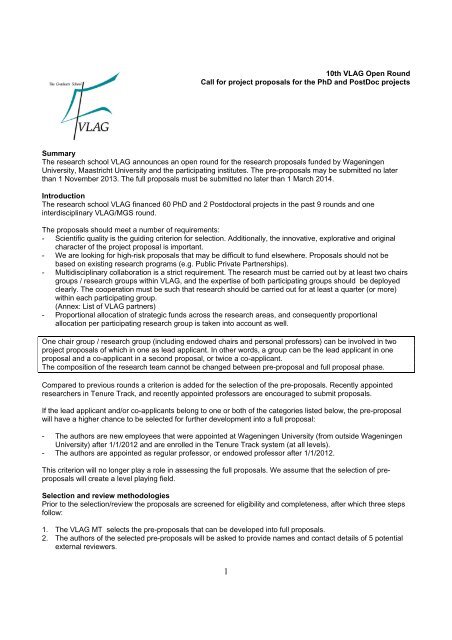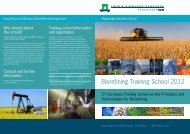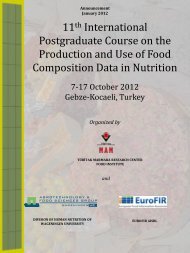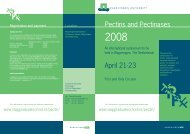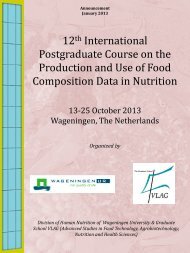10th VLAG Open Round Call for project proposals for the PhD and ...
10th VLAG Open Round Call for project proposals for the PhD and ...
10th VLAG Open Round Call for project proposals for the PhD and ...
You also want an ePaper? Increase the reach of your titles
YUMPU automatically turns print PDFs into web optimized ePapers that Google loves.
<strong>10th</strong> <strong>VLAG</strong> <strong>Open</strong> <strong>Round</strong><strong>Call</strong> <strong>for</strong> <strong>project</strong> <strong>proposals</strong> <strong>for</strong> <strong>the</strong> <strong>PhD</strong> <strong>and</strong> PostDoc <strong>project</strong>sSummaryThe research school <strong>VLAG</strong> announces an open round <strong>for</strong> <strong>the</strong> research <strong>proposals</strong> funded by WageningenUniversity, Maastricht University <strong>and</strong> <strong>the</strong> participating institutes. The pre-<strong>proposals</strong> may be submitted no laterthan 1 November 2013. The full <strong>proposals</strong> must be submitted no later than 1 March 2014.IntroductionThe research school <strong>VLAG</strong> financed 60 <strong>PhD</strong> <strong>and</strong> 2 Postdoctoral <strong>project</strong>s in <strong>the</strong> past 9 rounds <strong>and</strong> oneinterdisciplinary <strong>VLAG</strong>/MGS round.The <strong>proposals</strong> should meet a number of requirements:- Scientific quality is <strong>the</strong> guiding criterion <strong>for</strong> selection. Additionally, <strong>the</strong> innovative, explorative <strong>and</strong> originalcharacter of <strong>the</strong> <strong>project</strong> proposal is important.- We are looking <strong>for</strong> high-risk <strong>proposals</strong> that may be difficult to fund elsewhere. Proposals should not bebased on existing research programs (e.g. Public Private Partnerships).- Multidisciplinary collaboration is a strict requirement. The research must be carried out by at least two chairsgroups / research groups within <strong>VLAG</strong>, <strong>and</strong> <strong>the</strong> expertise of both participating groups should be deployedclearly. The cooperation must be such that research should be carried out <strong>for</strong> at least a quarter (or more)within each participating group.(Annex: List of <strong>VLAG</strong> partners)- Proportional allocation of strategic funds across <strong>the</strong> research areas, <strong>and</strong> consequently proportionalallocation per participating research group is taken into account as well.One chair group / research group (including endowed chairs <strong>and</strong> personal professors) can be involved in two<strong>project</strong> <strong>proposals</strong> of which in one as lead applicant. In o<strong>the</strong>r words, a group can be <strong>the</strong> lead applicant in oneproposal <strong>and</strong> a co-applicant in a second proposal, or twice a co-applicant.The composition of <strong>the</strong> research team cannot be changed between pre-proposal <strong>and</strong> full proposal phase.Compared to previous rounds a criterion is added <strong>for</strong> <strong>the</strong> selection of <strong>the</strong> pre-<strong>proposals</strong>. Recently appointedresearchers in Tenure Track, <strong>and</strong> recently appointed professors are encouraged to submit <strong>proposals</strong>.If <strong>the</strong> lead applicant <strong>and</strong>/or co-applicants belong to one or both of <strong>the</strong> categories listed below, <strong>the</strong> pre-proposalwill have a higher chance to be selected <strong>for</strong> fur<strong>the</strong>r development into a full proposal:- The authors are new employees that were appointed at Wageningen University (from outside WageningenUniversity) after 1/1/2012 <strong>and</strong> are enrolled in <strong>the</strong> Tenure Track system (at all levels).- The authors are appointed as regular professor, or endowed professor after 1/1/2012.This criterion will no longer play a role in assessing <strong>the</strong> full <strong>proposals</strong>. We assume that <strong>the</strong> selection of pre<strong>proposals</strong>will create a level playing field.Selection <strong>and</strong> review methodologiesPrior to <strong>the</strong> selection/review <strong>the</strong> <strong>proposals</strong> are screened <strong>for</strong> eligibility <strong>and</strong> completeness, after which three stepsfollow:1. The <strong>VLAG</strong> MT selects <strong>the</strong> pre-<strong>proposals</strong> that can be developed into full <strong>proposals</strong>.2. The authors of <strong>the</strong> selected pre-<strong>proposals</strong> will be asked to provide names <strong>and</strong> contact details of 5 potentialexternal reviewers.1
3. The review of each full proposal is per<strong>for</strong>med by 3 experts. This need not necessarily be <strong>the</strong> reviewerssuggested by <strong>the</strong> applicants.The breadth of <strong>the</strong> <strong>VLAG</strong> program implies that we cannot work with one group of referees who will review <strong>and</strong>rank all <strong>proposals</strong>. If possible, multiple <strong>proposals</strong> will be reviewed by one expert.The following criteria are used in assessing <strong>the</strong> full <strong>proposals</strong>:- Scientific Quality (proposal, originality, methodology, scientific perspectives)- Feasibility (work plan, use of existing knowledge, equipment/techniques, supervision, co-operation)All criteria are assessed both quantitatively (by assigning one of <strong>the</strong> four grades between ‘outst<strong>and</strong>ing’ <strong>and</strong>‘unsatisfactory’) <strong>and</strong> qualitatively. After receiving anonymous assessments <strong>the</strong> applicants can respond to <strong>the</strong>reviewers’ comments within <strong>the</strong> 'rebuttal' phase.Based on <strong>the</strong> experience from <strong>the</strong> previous rounds we may conclude that <strong>the</strong> procedures described above couldbe h<strong>and</strong>led fairly quickly <strong>and</strong> that <strong>the</strong> chance of success <strong>for</strong> <strong>the</strong> full <strong>proposals</strong> is about 60%.Available resourcesWithin this round, we hope to be able to support about 6 <strong>project</strong>s.The Graduate School solely provides <strong>the</strong> salary costs <strong>for</strong> <strong>the</strong> appointment of a <strong>PhD</strong> or PostDoc. The additional36% <strong>for</strong> <strong>the</strong> integral costs within Wageningen University is also provided. The lead applicant guarantees <strong>the</strong>financing of <strong>the</strong> research costs.Co-financingThe research institutes that submit a <strong>project</strong> proposal toge<strong>the</strong>r with university groups are expected to co-financepart of <strong>the</strong> salary <strong>and</strong> of <strong>the</strong> research costs. This contribution should be proportional to <strong>the</strong> extent of <strong>the</strong>involvement of <strong>the</strong> institute in <strong>the</strong> <strong>project</strong>.The rules based on previous experiences are as follows:- If <strong>the</strong> main applicant is from a research institute <strong>and</strong>/or <strong>the</strong> <strong>PhD</strong> student/PostDoc will be in part appointed<strong>and</strong> working at <strong>the</strong> institute <strong>the</strong>n <strong>the</strong> institute contributes at least 50% of <strong>the</strong> salary costs.- In case of cooperation between University group(s) <strong>and</strong> an institute with <strong>the</strong> university group as <strong>the</strong> leadapplicant, <strong>the</strong> institute contributes a minimum of 25% of salary costs.- In case of cooperation with a research group that is part of ano<strong>the</strong>r graduate school, <strong>the</strong>se researchschools/groups contribute 50% of <strong>the</strong> salary costs.Considering <strong>the</strong> total amount of K € 250 (integral cost structure within Wageningen UR) <strong>the</strong> salary costs <strong>for</strong> a<strong>PhD</strong> c<strong>and</strong>idate currently amount to k€ 62.5 per year.ProcedureThe pre-<strong>proposals</strong> can be submitted until 1 st November, 2013. For <strong>the</strong> pre-<strong>proposals</strong> <strong>the</strong> fixed <strong>for</strong>mat (2 A4pages in length) should be used. The <strong>for</strong>mat can be found at http://www.vlaggraduateschool.nl/vlagrounds.htm.All applications must be submitted in English. <strong>VLAG</strong> MT will decide which pre-<strong>proposals</strong> can be developed intofull <strong>proposals</strong> at <strong>the</strong> end of November / beginning of December 2013.The full <strong>proposals</strong> must be submitted ultimately on 1 st March 2014.The ranking of full <strong>proposals</strong>, based on <strong>the</strong> outcomes of <strong>the</strong> peer review <strong>and</strong> rebuttal, is done by <strong>the</strong> <strong>VLAG</strong> MT.The MT members who are involved as applicants will be replaced by ano<strong>the</strong>r PI from <strong>the</strong> <strong>VLAG</strong> community. Thefinal decision about <strong>the</strong> allocation of resources is <strong>the</strong> responsibility of <strong>the</strong> Scientific Director of <strong>VLAG</strong> <strong>and</strong> Directorof NUTRIM <strong>and</strong> will take place in August 2014.The earliest start date <strong>for</strong> <strong>the</strong> <strong>PhD</strong>/Postdoc <strong>project</strong>s granted within this <strong>Open</strong> <strong>Round</strong> is 1 January 2015. If asuitable c<strong>and</strong>idate is available, an earlier start date will be considered.Wageningen, May 20132
Annex: Partners within Graduate School <strong>VLAG</strong>Wageningen University - Department Agro-Technology & Food SciencesMore in<strong>for</strong>mation: http://www.wageningenur.nl/en/Expertise-Services/Chair-groups.htmCluster Food Sciences:1. Food Chemistry, Prof. H. Gruppen2. Food Microbiology, Prof. M.H. Zwietering3. Food Process Engineering, Prof. R.M. Boom4. Food Quality <strong>and</strong> Design, Prof. V. Fogliano5. Physics <strong>and</strong> Physical Chemistry of Foods, Prof. E. van der LindenCluster Bio-based Sciences:6. Biobased Commodity Chemicals, Prof. J. S<strong>and</strong>ers / Prof. H. Bitter7. Bioprocess Engineering, Prof. R.H. WijffelsCluster Bio-molecular Sciences:8. Biochemistry, Prof. S. de Vries9. BioNano Technology, Prof. A.H. Velders10. Biophysics, Prof. H. van Amerongen11. Microbiology, Prof. W.M. de Vos12. Organic Chemistry, Prof. H. Zuilhof13. Physical Chemistry <strong>and</strong> Colloid Sciences, Prof. J. Van Der Gucht14. Systems <strong>and</strong> Syn<strong>the</strong>tic Biology, Prof. V. Martins Dos Santos15. Host-Microbe Interactomics, Prof. J. Wells* (Animal Sciences Group)Cluster Nutrition Sciences:16. Nutrition & Health, Prof. F.J. Kok17. Nutrition & Epidemiology, Prof. P. van ‘t Veer18. Nutrition, Metabolism & Genomics, Prof. M. Muller19. Nutrition & Pharmacology, Prof. R. Witkamp20. Sensory Science <strong>and</strong> Eating Behaviour, Prof. C. de Graaf21. Toxicology, Prof. I.M.C.M. RietjensMaastricht University - NUTRIM - School <strong>for</strong> Nutrition, Toxicology & MetabolismMore in<strong>for</strong>mation about <strong>the</strong> research groups at: http://www.maastrichtuniversity.nl/NUTRIMResearch Line 1: Metabolic syndrome (Prof. R.P. Mensink)- Programme 1: Energy balance <strong>and</strong> obesity- Programme 2: Diabetes <strong>and</strong> cardiovascular disease riskResearch Line 2: Gut-liver homeostasis (Prof. A.A.M. Masclee)- Programme 1: Gut-liver metabolism- Programme 2: Intestinal integrity <strong>and</strong> defenceResearch Line 3: Chronic inflammatory disease <strong>and</strong> wasting (Prof. L.J.C. van Loon)- Programme 1: Inflammation <strong>and</strong> oxidant-antioxidant networks- Programme 2: Skeletal muscle weakness in ageing <strong>and</strong> diseaseResearch Line 4: Gene-environment interactions (Prof. F.J. van Schooten)- Programme 1: Disease susceptibilityFood & Biobased Research (FBR) - Contact: Prof. Harry Wichers or Erik van SeventerRIKILT- Institute of Food Safety - Contact: Prof. Michel NielenTNO Healthy Living - Contact: Dr Henk HendriksNIZO Food Research - Contact: Dr. Peter de JongRIVM - National Institute of Public Health <strong>and</strong> <strong>the</strong> Environment – Contact: Prof. Hans Verhagen3


